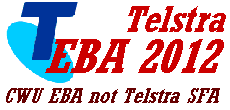


|
CWU: Your Voice in Enterprise Bargaining |
CWUnion: Your Voice in Enterprise Bargaining
Fair Work Australia still considering Telstra EA.
The Telstra Enterprise Agreement 2012-2015 is still before Fair Work Australia (FWA).
Before Fair Work Australia can approve the Agreement it must be satisfied that it meets the Better Off Overall Test (BOOT). This involves FWA checking the Agreement against the relevant award provisions for different groups of employees.
In the case of this most recent Agreement FWA's job has been complicated by the fact that the new EA is designed to cover nearly all Telstra employees including those previously covered by separate agreements such as the Salesforce and Senior Officers agreements.
FWA has now asked for clarification of the relevant award classification structures and pay rates for Telstra retail employees. It needs this so that it can assess whether or not Section 9 of the EA (Telstra retail outlets) meets the BOOT.
FWA has asked that this information be provided by 9 November. The CWU would expect a decision on the EA to be made soon after that date.
1. Telstra EA: approval expected soon
The Telstra Enterprise Agreement 2012-2015 is currently before Fair Work Australia (FWA) for approval.
Under the Fair Work Act, FWA has to assess the agreement to make sure that it complies with all the requirements of that legislation. In particular it has to be sure that the agreement meets the Better Off Overall test i.e. that employees on the agreement are better off overall than they would be if they were simply on award conditions.
There is a number of relevant awards that will have to be looked at as part of this exercise. The changed format of the Agreement, which has no clause numbers and is worded differently from the awards, may create difficulty in assessing the Agreement.
The CWU understands however that FWA is attempting to deal with the Agreement as soon as possible and that no obstacles to its being approved are expected to arise.
Once the Agreement is approved, the pay rises it provides for will be paid on the first pay day after that approval and will be backdated to the first pay period in October.
2. Telstra reviews facilitative/flexibility agreements
The new Telstra Enterprise Agreement (EA) establishes the conditions of employment that will apply to most Telstra employees for the next three years.
Under the Agreement, however, Telstra and employees have the option of varying those conditions if agreement can be reached about doing so.
The main mechanism for making such changes is the group facilitative agreement or "group flexibility agreement" as it is called in the new EA.
Telstra has traditionally made use of these agreements in areas such as Network Construction where teams are sometimes required to work non-standard hours in remote locations over a set cycle e.g. three weeks on one week off. A recent dispute involving CWU members working in such locations has highlighted the need to standardise procedures where changes to standard working conditions are required.
So Telstra is now reviewing all current Network Construction facilitative/flexibility agreements while at the same time working with the CWU to develop a template for future agreements.
The procedures will, of course, be governed by the requirements of the EA in this area i.e. such agreements
CWU members who are already on or are approached to move onto such an agreement should make sure these rules are being observed. The CWU also strongly advises members to contact their state branch to discuss any such proposals before agreeing to them.
1. Strong support for Telstra Agreement
Telstra employees have given a clear vote of approval to the proposed Telstra Enterprise Agreement 2012-2015.
As most E-bulletin readers will now know, just over 80% of those who voted in the ballot voted YES. Equally significant was the high participation rate with some 60% of all employees who were eligible to vote doing so.
These results are a strong endorsement of the Agreement and are in accord with the feedback that the CWU received from members and other employees during the consultation period.
During that period, the union received a number of queries about aspects of the Agreement, including the pay differential between former EA and ECA employees, the continuation of overtime entitlements for technical staff and the number of rest breaks for call centre employees.
On the whole, however, CWU officials reported a positive response from members to the total Agreement package, including to the level of the pay rise which for most CWU members will average just over 4% per annum (once the effect of compounding is taken into account).
The Agreement must now be lodged with Fair Work Australia and will become operative once it has been approved. The new pay rates, however, will be effective as from 1 October, with the first pay based on the new rates due on 10 October.
 | Telecom |